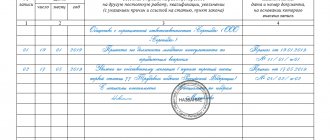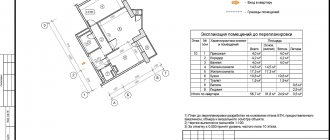Grounds for declaring residential premises unsuitable
The beginning of the procedure is based on the identification of harmful factors that pose a threat to the life and health of citizens, preventing them from ensuring their safety, due to the fact that:
- due to physical wear and tear, the operational characteristics of the premises have deteriorated
- the environment and microclimate parameters of the premises have changed, which does not allow compliance with sanitary and epidemiological requirements and hygienic standards
An apartment building may be considered unsafe due to its poor technical condition. Due to the recognition of an apartment building as unsafe, the residential premises in such a building are unsuitable for living (more details on the website at the link).
How to recognize a house as unsafe
- photocopies of documents for the apartment, certified by a notary;
- plan of a residential property;
- registration certificate for the house;
- statements from owners (complaints from neighbors) about the building’s non-compliance with standards;
- an inspection report (over the last three years) of a residential building, which reflects the types and volumes of repairs that were carried out during the specified period;
- a document indicating the technical condition of the housing, which was issued by an enterprise with a license to carry out design and survey work;
- acts of the housing inspection of the region of the Russian Federation with the result of implemented state control measures in accordance with the norms of legislation on the use and safety of the object;
- other documents that the representative of the territorial office will name.
- the supporting and enclosing structure is damaged or deformed;
- There are no separate elements of engineering communications (the water supply does not work, there is no electricity supply);
- ventilation integrates the air flows of the kitchen, sanitary and living rooms;
- temperature indicators do not exceed 18 degrees for a long time;
- humidity indicators more than 60%;
- there is no insolation in the number of rooms specified by the standards;
- the object is located in the basement or basement;
- there are no windows in the rooms;
- Toxic substances were found in the apartment.
The procedure for declaring residential premises unfit for habitation
There is Decree of the Government of the Russian Federation dated January 28, 2006 No. 47 on how to recognize housing as dangerous for living. The procedure is as follows:
- To begin with, the owner or other person can file a complaint about the unsuitability of housing to the housing inspectorate. You can immediately submit an application to the administration in order to conduct a housing inspection by an interdepartmental commission
- further, an interdepartmental commission, created to inspect the premises for their suitability for habitation, assesses the housing for compliance with the requirements that apply to residential premises and makes a decision on its suitability or unsuitability for habitation
- the commission draws up a conclusion and draws up an inspection report of the premises
- based on the results of the work of the commission by a state body. authorities or local government makes a decision on the suitability or danger for habitation of housing
- one copy of the decision is given to the applicant
Recognition of an individual (private) house as unsuitable for habitation
The legal burden of ownership imposes on the owner the obligation to seek (find, provide) the necessary financial resources for the timely execution of current and major repairs of his residential building or residential premises in order to prevent the residential premises in which people permanently live and stay from becoming uninhabitable and life-threatening people are in a condition in which living in such a room would be simply dangerous and impossible.
We recommend reading: How much does paid privatization cost?
Thus, after a citizen’s house (residential premises) is declared unfit for habitation and not subject to repair and reconstruction in accordance with clause 1, part 2, art. 57 of the Housing Code of the Russian Federation, the right arises, and the local government body has the obligation to accept such a citizen and his family for priority provision of residential premises under a social tenancy agreement.
Documents for recognizing housing for demolition
To recognize housing as unsafe for living, the following documents are provided to the commission:
- application for recognition of housing as unfit for habitation
- copies of title documents for housing, if the right is not registered in the Unified State Register of Real Estate
If an apartment building is recognized as unsafe, which entails the recognition of housing in such a building as unsuitable, it is also necessary to provide an additional document, such as a conclusion from a specialized organization that conducted an inspection of the apartment building.
If it is necessary to recognize the housing as not meeting the established requirements, then a conclusion from a specialized organization that conducted an examination of the enclosing and load-bearing structures of the housing is also provided.
In addition, at the discretion of the applicant, statements, letters, and complaints from citizens may be provided stating that the living conditions in a particular house are unsatisfactory.
Consultation with a lawyer on issues of uninhabitable housing
Information about non-compliance with the established requirements, indicating the actual value of the indicator or a description of a specific non-conformity: Due to long-term use and heavy wear, the foundation is curved, cracks are visible in the base. There is blowing, freezing, rot damage and settlement of the lower crowns on the walls. Plank floors have deflections and subsidence, broken in places. Small cracks, deflection of beams, and damage to the upper layers by wood fungus are observed on the floors. The door and window openings are rotten, the blocks are warped, and the vestibule is loose. Conclusion of the interdepartmental commission: “On the recognition of a residential building as unsuitable for permanent residence (dilapidated), taking into account the inappropriateness of major repairs due to a significant degree of biological damage to structural elements, which led to deformation of the foundation, load-bearing structures, and indicate the exhaustion of the load-bearing capacity and the danger of collapse. » The 61% depreciation of the house was indiscriminately assessed by the BTI. The house was built in 1935, there was no gas installed, but they wrote that it was built in 1960, and gas heating was installed. In fact, the house is in disrepair. Is the housing described as in disrepair? Does the owner, a lonely old woman, a disabled person of group 1, have the right to housing out of turn, even if the housing is recognized as dilapidated?
I live in a 4-room apartment. My room (13.5 sq.m.) is in the property. When my daughter was born, she and I got on the waiting list for housing expansion. After some time, a room became available in the apartment (my grandmother died), it was municipal, and no one else was registered. The room was supposed to go to my daughter and I. But our administration is in no way. In general, I filed a lawsuit and we won the case. The court decided to provide the room under a social rental agreement. The room is in a condition unsuitable for habitation (plaster is falling off almost the entire perimeter of the room in a strip about 1 m wide, there are cracks in the ceiling, the door frame needs to be replaced, the window, radiators and the floor need to be painted). A master from our house management drew up a report on this. I went to an appointment with the deputy mayor, asked that they at least do the walls, ceiling and wallpaper, he told me to sign a social rental agreement, and that they would help make repairs, but in the end they only plastered the walls and ceiling. I tell them, help me put up the wallpaper, I can’t do it alone. To which they answered me - they did everything to the minimum, then do it yourself. Today I went to an appointment with the head of the municipal housing department of the Severodvinsk Administration with a question about renovating a room. He told me straight out that he wouldn’t do anything. Supposedly you got what you wanted through the court, be content. I believe that the social tenancy agreement should be fulfilled regardless of how the room was obtained, through the court or not (especially since they should have provided me with this room without the court). The contract states that within 10 days after signing the landlord must provide a room with current repairs carried out (but this did not happen). I read the comments to Article 65 of the RF Housing Code: clause 7. Carrying out major repairs to residential premises transferred under a social tenancy agreement is also the responsibility of the landlord. Please tell me how to act. Go to court again? Will it help?
We recommend reading: What Types of Work Are Included in the Major Repair of an Apartment Building
How to draw up an application to declare an apartment unfit for habitation?
The application form can be accepted or a sample developed in the state. authorities or local governments. If such a form is not available, then when preparing the appropriate application, indicate the following in it:
- To whom the application is addressed, as a rule, it is written to the interdepartmental commission
- from whom the application is being submitted is required to indicate the full name, place of residence, telephone number, they may also be asked to provide passport details
- title of the document - statement
- the text of the application sets out the circumstances of filing such an application and a request to consider the issue of declaring the housing unfit for habitation or to evaluate the housing for suitability for living in it
- The appendix lists the attached documents
- the application must contain the signature of the applicant
HEALTHY:
Consequences of recognizing residential premises as dilapidated or unsafe
The consequences of declaring residential premises unfit for habitation are the following:
- termination of the rental agreement , if any
- Owners of unsuitable housing have the right to receive another housing instead of the one being seized or to receive compensation for the housing that is being seized . At the same time, in individual municipalities, different practices are developing in the issue of providing other housing in place of the seized one, namely, as part of the resettlement program, new apartment buildings are built, and for some, new housing is simply provided in exchange for the demolished one, and for others, new housing is provided, but with the obligation resettled citizens make an additional payment for new housing, the cost of which is greater than that which is recognized as unsuitable
- if housing in a dilapidated apartment building was purchased after the building was declared in disrepair, then the persons who purchased the housing have the right to compensation in the monetary equivalent of compensation
State bodies The authorities of the constituent entities of the Russian Federation may establish additional support measures in the event of recognition of housing for demolition.
The procedure for recognizing a house as unsafe: commission
Housing can be considered dilapidated if it is more than sixty-five percent dilapidated. However, after the commission recognizes it as such, there will be no resettlement. You can get a new apartment only when the current housing is considered subject to demolition. Such a decision is made only if the construction of new facilities is planned on the site of a given apartment or private building.
- Carrying out major repairs and reconstruction of an apartment building or other residential premises;
- Recognition of housing as suitable for living in it;
- Recognition of a property as unsafe and subject to demolition;
- Recognition of an apartment or individual private house as dilapidated and uninhabited.
We recommend reading: Clarification of the claims of the Civil Procedure Code
Housing lawyer in Yekaterinburg
It can be difficult for an ordinary citizen to ensure that his home is designated for demolition. The housing lawyers of our Law Office “Katsailidi and Partners” are always ready to help in resolving the issue of declaring housing unsuitable, if it is such. When you seek help from our lawyers on this issue, you can count on:
- for consultation on the issue of repossession of a house due to dilapidation and (or) disrepair
- examination and evaluation by a lawyer of documents related to housing
- preparation of an application for recognition of dilapidated housing or a house in disrepair
- representing the interests of the principal in government bodies, local government, and, if necessary, in court
- appealing actions, decisions of authorities, local government
- collecting the necessary documents for demolishing the house and providing decent monetary compensation in return
- provision of other legal assistance







